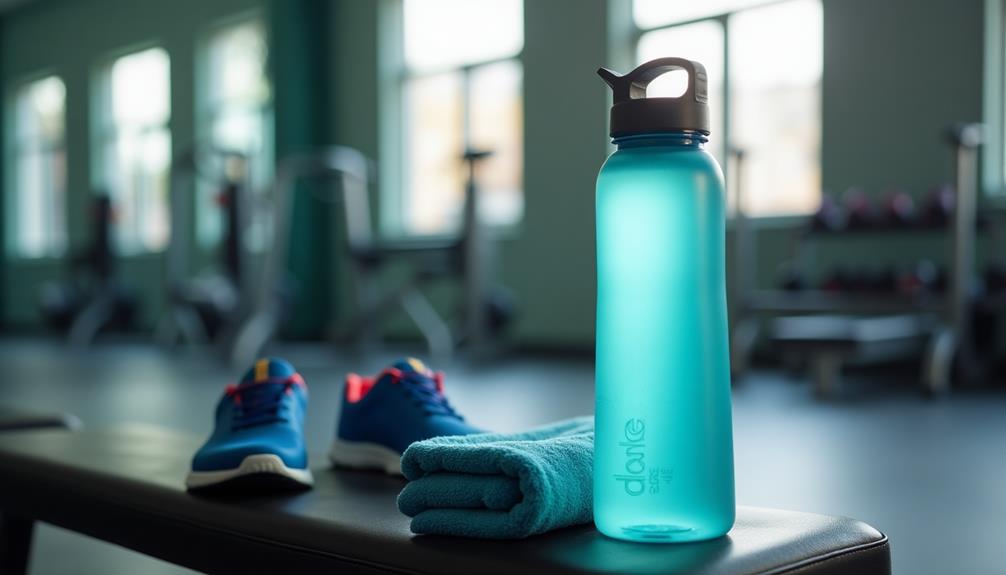To reduce post-workout fatigue, start by drinking water two hours before exercising—aim for 16-20 ounces. During your workout, sip water regularly, targeting 7-10 ounces every 10-20 minutes. After exercising, replenish electrolytes with drinks or foods like bananas. Incorporate hydrating options like watermelon and cucumbers for extra recovery benefits. Keep an eye on your fluid intake throughout the day, aiming for light-colored urine as a hydration goal. Use sports drinks wisely for workouts over an hour, and establish a hydration routine to stay on track. There's plenty more to explore about effective hydration strategies for enhanced performance.
Core Insights
- Start hydrating early by drinking 16-20 ounces of water 2 hours before your workout to boost energy levels.
- During exercise, sip 7-10 ounces of water every 10-20 minutes to maintain hydration and prevent fatigue.
- Post-workout, replenish electrolytes with sports drinks or foods like bananas to support muscle recovery and reduce exhaustion.
- Include hydrating foods like watermelon and oranges in your post-workout meal to enhance fluid intake and nutrient recovery.
- Monitor your fluid intake throughout the day and aim for clear urine to ensure adequate hydration and prevent post-workout fatigue.
Drink Water Before Exercise
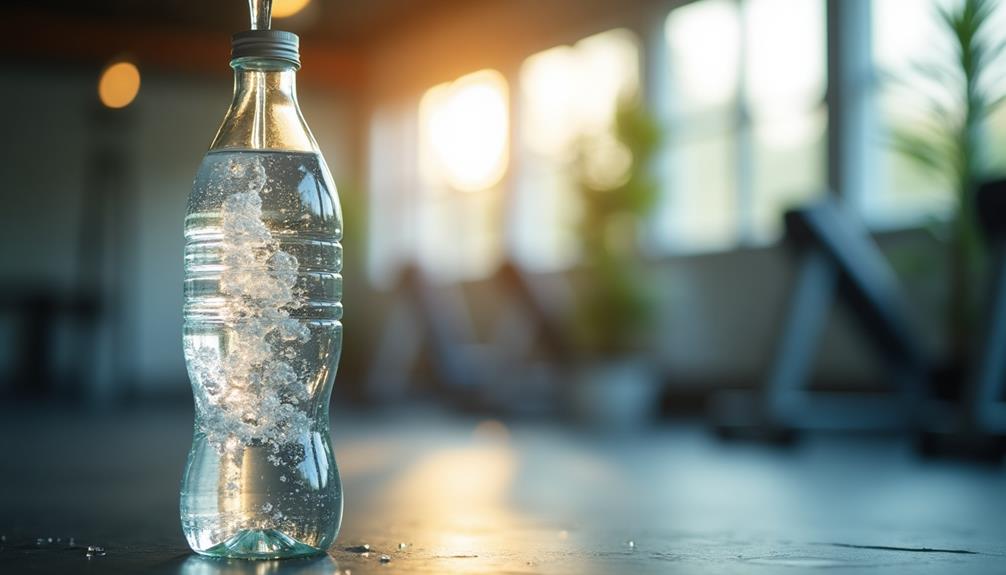
To kick off your workout effectively, make sure you hydrate by drinking water beforehand. Proper hydration is necessary for best performance and can greatly impact your energy levels. Aim to drink at least 16 to 20 ounces of water about two hours before you start exercising. This gives your body enough time to absorb the fluid. For enhanced hydration, consider using top hydration powders that can replenish electrolytes and support peak performance during your workout.
If you're short on time, try to consume another 8 ounces about 20-30 minutes before your workout. Remember, dehydration can lead to fatigue, cramps, and decreased endurance. Listening to your body is important; if you feel thirsty, don't ignore it. Staying adequately hydrated before you exercise sets the stage for a more productive workout and helps reduce post-workout fatigue.
Hydrate During Your Workout
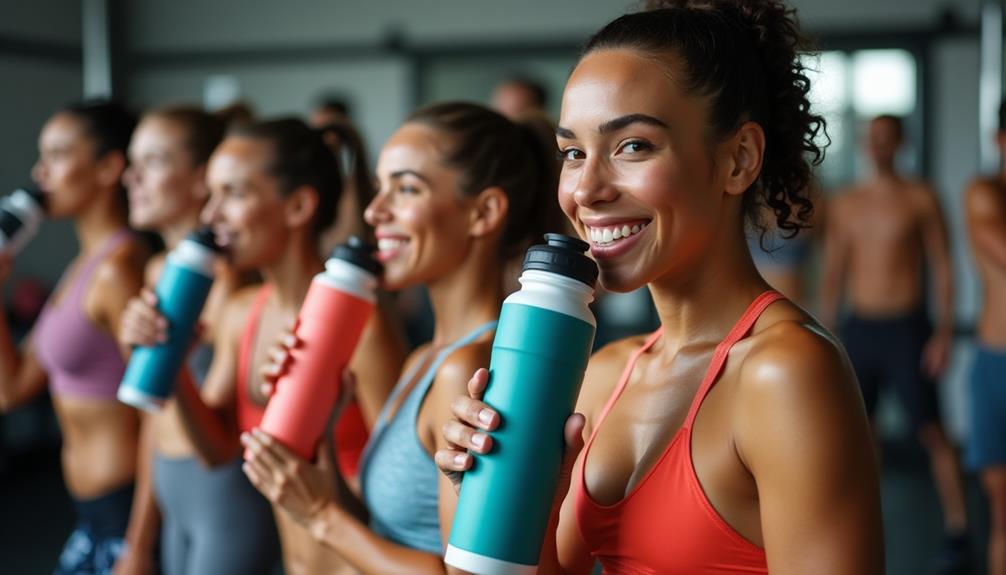
- Sip regularly: Don't wait until you're thirsty; take small sips throughout.
- Choose water: Plain water is often sufficient for most workouts.
- Know your duration: For sessions over an hour, consider a sports drink. Electrolyte-rich options like BODYARMOR or coconut water can help replenish essential minerals lost during intense exercise.
- Track your intake: Aim for about 7-10 ounces every 10-20 minutes.
- Listen to your body: Pay attention to signs like dry mouth or fatigue.
Replenish Electrolytes Post-Workout
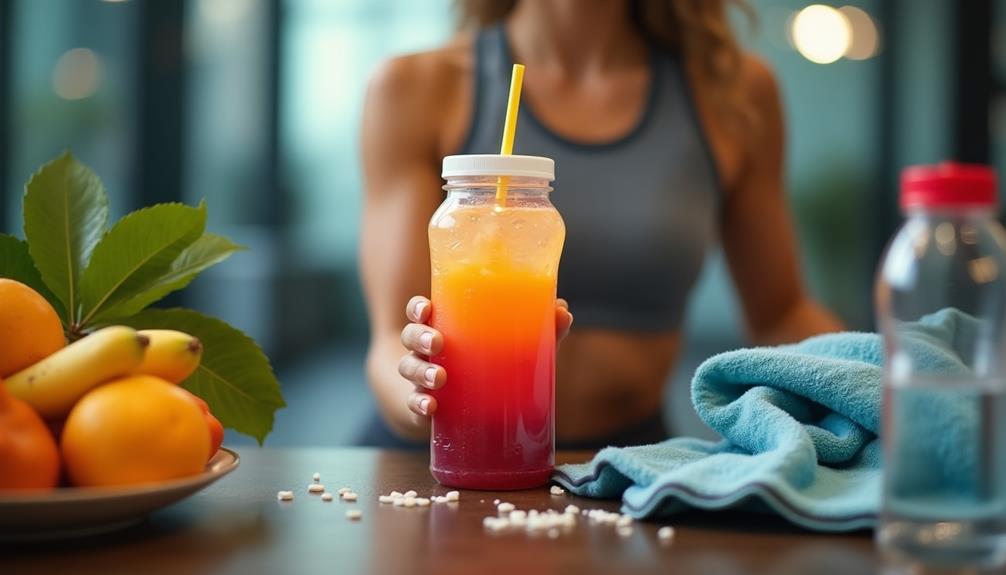
After an intense workout, replenishing electrolytes is crucial to help your body recover and reduce fatigue. Electrolytes, like sodium, potassium, and magnesium, support muscle function and maintain fluid balance. When you sweat, you lose these essential minerals, which can lead to cramping and exhaustion. For a convenient and tasty option, electrolyte gummies are becoming increasingly popular among athletes and fitness enthusiasts. These chewable supplements offer a quick and easy way to restore necessary minerals.
To effectively replenish electrolytes, consider drinking a sports drink or an electrolyte-infused water right after exercising. Alternatively, you can consume electrolyte tablets or powders mixed with water. If you prefer whole foods, try a banana for potassium or a handful of salted nuts for sodium.
Choose Hydrating Foods
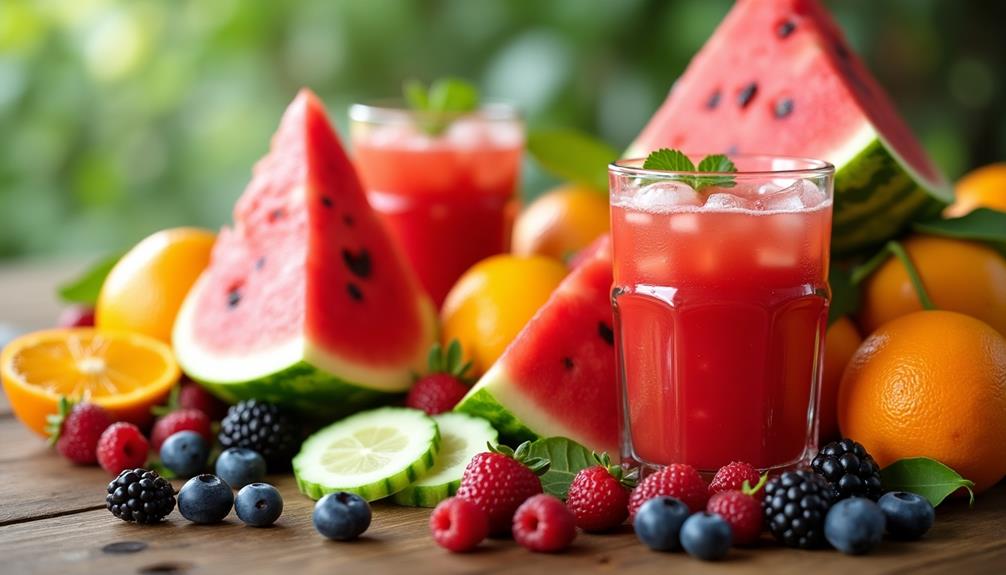
Hydration is crucial for recovery, and integrating hydrating foods into your post-workout routine can greatly enhance your efforts. These foods not only provide fluids but also deliver essential nutrients that help your body bounce back. Here are some excellent choices to ponder:
- Watermelon: Packed with water and electrolytes, it's invigorating and hydrating.
- Cucumbers: Low in calories and high in water content, they make a crispy snack.
- Celery: This crispy veggie is about 95% water and great for hydration.
- Oranges: Juicy and sweet, they're also high in vitamin C and hydration.
- Strawberries: These berries are not only delicious but also an excellent water source.
Including these foods in your meals or snacks can significantly enhance your hydration and recovery.
Monitor Your Fluid Intake

Monitoring your fluid intake is essential for best recovery after workouts. Keeping track of how much you drink helps guarantee you're replacing lost fluids effectively. Start by noting your water consumption throughout the day, especially before and after your workout.
A simple way to assess your hydration is to pay attention to your body. If you're feeling thirsty or your urine is dark, it's a sign you need to drink more. Aim for clear or light-colored urine as a hydration goal.
Consider using a water bottle with measurements marked on it. This way, you can easily track your intake. Remember, proper hydration not only enhances recovery but also helps maintain energy levels for your next workout.
Use Sports Drinks Wisely

Here are some tips to keep in mind:
- Choose the appropriate drink: Look for options that contain necessary electrolytes, like sodium and potassium.
- Timing is important: Consume sports drinks during or immediately after workouts for best recovery.
- Understand your needs: If you're exercising for less than an hour, water might be adequate.
- Check the labels: Be mindful of extra sugars and calories to prevent overconsumption.
- Combine with food: Pair drinks with a nutritious snack for a more efficient recovery.
Establish a Hydration Routine
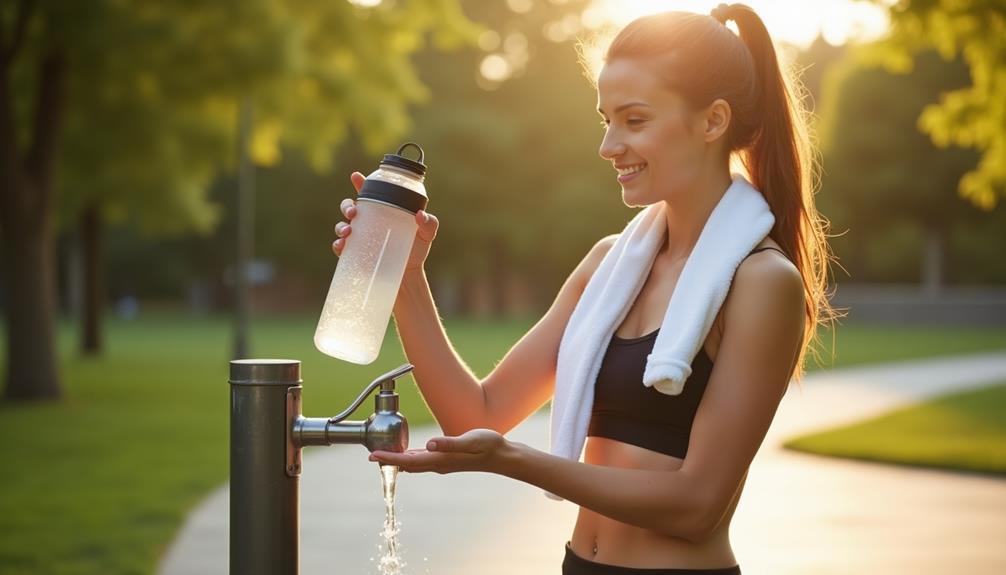
Creating a consistent hydration routine can greatly improve your recovery and overall performance. Start by setting specific hydration goals for each day. Aim to drink water regularly throughout the day, not just during workouts. You can carry a reusable water bottle to remind yourself to sip frequently.
Consider timing your hydration. Drink water before, during, and after your exercise sessions. This helps maintain peak fluid levels and prevents fatigue.
Don't forget to listen to your body. If you feel thirsty, drink! Also, monitor the color of your urine; a pale yellow indicates good hydration.
Frequently Asked Questions
How Much Water Should I Drink Daily for Optimal Hydration?
You should aim for about 2 to 3 liters of water daily, adjusting based on your activity level, climate, and individual needs. Listen to your body, and drink when you feel thirsty.
Can Dehydration Affect My Performance in Non-Intense Workouts?
Yes, dehydration can negatively impact your performance, even in non-intense workouts. You might feel fatigued, experience decreased focus, and struggle with coordination. Staying adequately hydrated helps you maintain peak energy levels and overall effectiveness during exercise.
What Are the Signs of Dehydration to Watch For?
You should watch for signs of dehydration like dry mouth, fatigue, dizziness, dark urine, and increased thirst. If you notice these symptoms, it's crucial to hydrate quickly to maintain your performance and overall well-being.
Are There Any Alternatives to Plain Water for Hydration?
If you're looking for hydration alternatives, consider coconut water, herbal teas, or electrolyte drinks. These options not only replenish fluids but also provide essential nutrients, making them great choices to keep you hydrated and energized.
How Does Caffeine Impact Hydration Levels During Exercise?
When you sip caffeine, it's like inviting a double-edged sword into your workout. While it can boost energy, it might also lead to dehydration if consumed in excess, so moderation's key during exercise.

